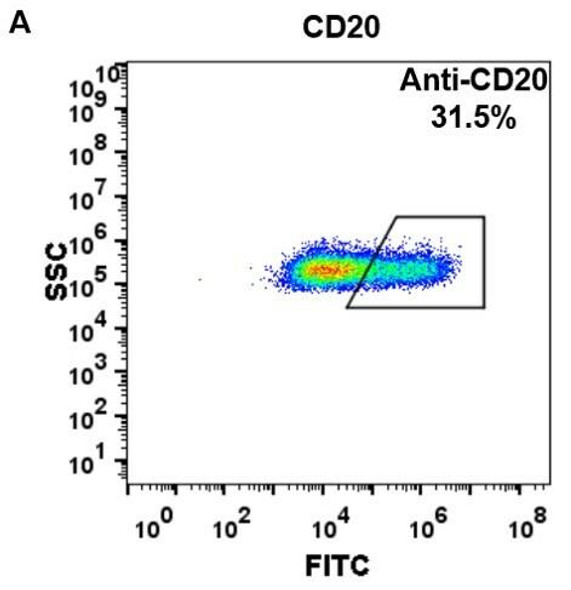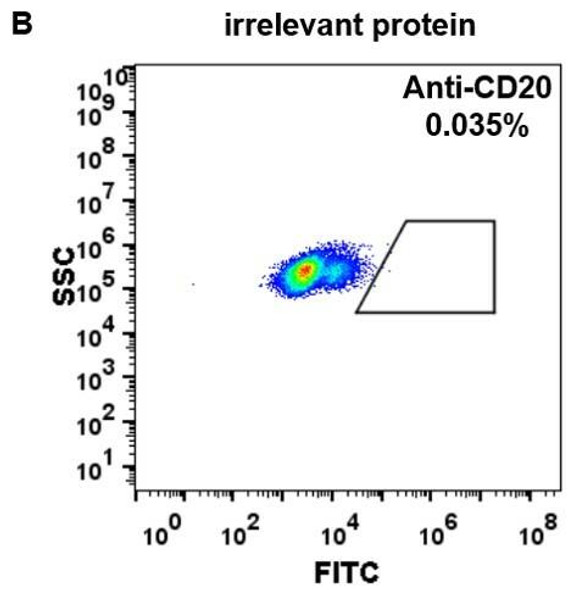Description
| Product Name: | Anti-Human CD20 (Rituximab) - PE |
| SKU: | IVMB0525 |
| Size: | 50 µg |
| Antibody Type: | Biosimilar Recombinant Human Monoclonal Antibody |
| Clone: | 10F381 |
| Target: | CD20 |
| Isotype: | Human IgG1κ |
| Host Species: | Human |
| Reactivity: | Human/Rhesus Monkey/Cynomolgus Monkey |
| Applications: | FC |
| Expression Host: | HEK-293 Cells |
| FC Effector Activity: | Active |
| Synonyms: | B1; S7; Bp35; CVID5; MS4A2; LEU-16; MS4A1; membrane spanning 4-domains A1 |
| Product Concentration: | 0.2 mg/ml |
| Excitation Laser: | Blue Laser (488 nm) and/or Green Laser (532 nm)/Yellow-Green Laser (561 nm) |
| Immunogen: | Human lymphoblastoid cell line SB. |
| Applications and Recommended Usage: | FC The suggested concentration for Rituximab biosimilar antibody for staining cells in flow cytometry is ≤ 1.0 μg per 106 cells in a volume of 100 μl. Titration of the reagent is recommended for optimal performance for each application. |
| Antigen Distribution: | CD20 is primarily found on the surface of immune system B cells. CD20 is highly expressed in the lymph node, and to a lesser extent, the spleen and appendix. |
| Formulation: | This R-phycoerythrin (R-PE) conjugate is formulated in 0.01 M phosphate buffered saline (150 mM NaCl) PBS pH 7.4, 1% BSA and 0.09% sodium azide as a preservative. |
| Specificity: | This non-therapeutic biosimilar antibody uses the same variable region sequence as the therapeutic antibody Rituximab. Clone 10F381 recognizes human CD20. This product is for research use only. |
CD20 is a 33-37 kD transmembrane-spanning phosphoprotein found on the surface of developing B-cells and various B-cell malignancies. CD20 is a popular target for mAb therapy because depleting developing B-cells generally does not cause permanent side effects (due to the fact that mature plasma cells and B-cell progenitors do not express CD20 and that there is limited expression of CD20 among other cell lineages). Rituximab is a chimeric monoclonal antibody that binds to CD20. The precise function of CD20 is still unknown. However, it is suspected to play a role in Ca2+ influx across plasma membranes, maintaining intracellular Ca2+ concentration, and allowing the activation of B cells. Rituximab is used to treat some autoimmune diseases and types of cancer such as non-Hodgkin lymphoma, chronic lymphocytic leukemia, and rheumatoid arthritis among others. The Fc portion of Rituximab mediates antibody-dependent cellular cytotoxicity (ADCC) and complement-dependent cytotoxicity (CDC). Rituximab increases MHC II and adhesion molecules LFA-1 and LFA-3 (lymphocyte function-associated antigen) and also induces apoptosis of CD20+ cells. This ultimately results in the elimination of B cells (including the cancerous ones) from the body, and thus allows a new population of healthy B cells to develop from lymphoid stem cells. Anti-Human CD20 (Rituximab) utilizes the same variable regions from the therapeutic antibody Rituximab making it ideal for research projects.
| Regulatory Status: | Research Use Only (RUO). Non-Therapeutic. |
| Storage and Handling: | This R-phycoerythrin (R-PE) conjugate is stable when stored at 2-8°C.Do not freeze. |
| Research Area: | Biosimilars |







